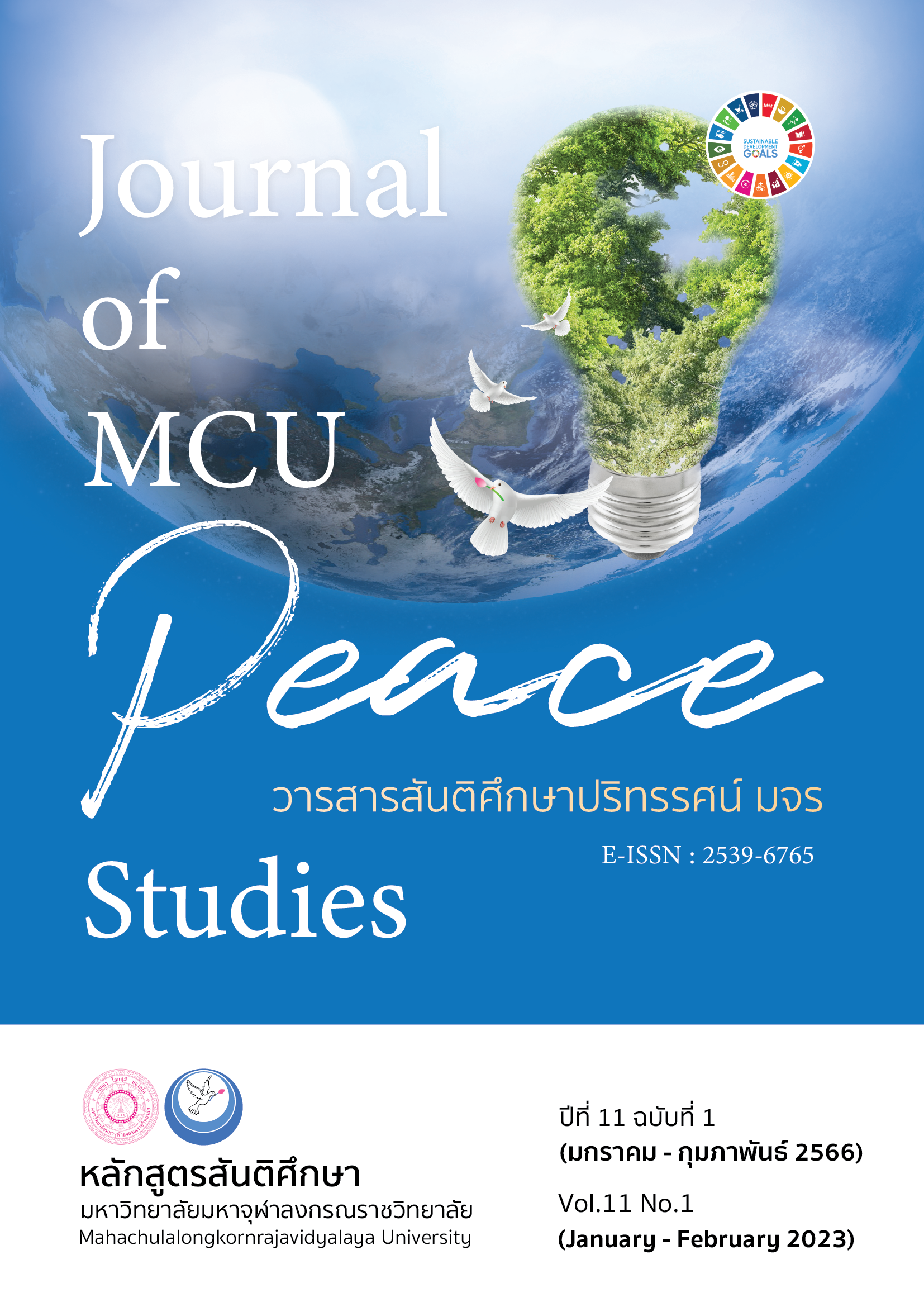แบบสมรรถนะทางสังคมของนักเรียนโรงเรียนขยายโอกาส
Main Article Content
บทคัดย่อ
บทความวิจัยนี้ มีวัตถุประสงค์เพื่อ 1) เพื่อศึกษาสภาพปัจจุบันของการจัดกิจกรรมเพื่อเสริมสร้างสมรรถนะทางสังคมของนักเรียนโรงเรียนขยายโอกาส 2) เพื่อสร้างแบบสมรรถนะทางสังคมของนักเรียนโรงเรียนขยายโอกาส 3) เพื่อประเมินแบบสมรรถนะทางสังคมของนักเรียนโรงเรียนขยายโอกาส ใช้วิธีวิจัยเชิงคุณภาพ ทำการวิเคราะห์เนื้อหาจากแหล่งข้อมูลเอกสาร การสนทนากลุ่มย่อย และการสังเกตปรากฏการณ์จริง โดยตรวจสอบข้อมูลแบบสามเส้าและนำเสนอข้อมูลโดยใช้เทคนิคการพรรณนาวิเคราะห์
ผลการวิจัยพบว่า
1. สภาพปัจจุบันของการจัดกิจกรรมเพื่อเสริมสร้างสมรรถนะทางสังคมของนักเรียนโรงเรียนขยายโอกาส พบว่า นักเรียนขาดวินัย ความรับผิดชอบ ใช้เวลากับสื่อโซเซียลมากกว่าการใช้เพื่อการเรียน โดยกลุ่มเพื่อนมีอิทธิพลต่อพฤติกรรมของนักเรียน เช่น มีการเลียนแบบกัน มีการกลั่นแกล้งกัน อีกทั้งปัจจัยสิ่งแวดล้อมไม่เอื้อให้เกิดการเรียนรู้ เช่น เด็กอยู่พื้นที่ห่างไกลหรือเป็นถิ่นทุรกันดาร ส่งผลให้การเข้าถึงอุปกรณ์การเรียนได้ยาก มีการขาดแคลนครูที่มีความเชี่ยวชาญเฉพาะด้าน
2. แบบสมรรถนะทางสังคมของนักเรียนโรงเรียนขยายโอกาส พบว่า มี มี 5 องค์ประกอบ คือ 1) ชื่อสมรรถนะ 2) นิยามสมรรถนะ 3) องค์ประกอบสมรรถนะ 4) กิจกรรมพัฒนาสมรรถนะ และ 5) การประเมินผลกิจกรรมพัฒนาสมรรถนะ โดยแบบสมรรถนะทางสังคมของนักเรียนโรงเรียนขยายโอกาส แบ่งได้เป็น 3 ระดับ ได้แก่ 1) ระดับตนเอง 2) ระดับระหว่างบุคคล และ3) ระดับชุมชน/สังคม
3. ผลประเมินแบบสมรรถนะทางสังคมของนักเรียนโรงเรียนขยายโอกาส พบว่า การประเมินความเป็นไปได้ของแบบสมรรถนะทางสังคมทางสังคมของนักเรียนโรงเรียนขยายโอกาส ได้ระดับมากที่สุด มีผลการประเมินเฉลี่ย 4.65 และการประเมินความเหมาะสมในการนำไปใช้ปฏิบัติของแบบสมรรถนะทางสังคมทางสังคมของนักเรียนโรงเรียนขยายโอกาส ได้ระดับมากที่สุด มีผลการประเมินเฉลี่ย 4.65
Article Details

อนุญาตภายใต้เงื่อนไข Creative Commons Attribution-NonCommercial-NoDerivatives 4.0 International License.
ทัศนะและความคิดเห็นที่ปรากฏในบทความในวารสาร ถือเป็นความรับผิดชอบของผู้เขียนบทความนั้น และไม่ถือเป็นทัศนะและความรับผิดชอบของกองบรรณาธิการ ยินยอมว่าบทความเป็นลิขสิทธิ์ของวารสาร
เอกสารอ้างอิง
American Field Service. (2020). New Zealand Globle Competence Certificate. Retrieved July 20, 2021, from https://opec.go.th/wp-content/uploads/2021/06/NZGCC-Curriculum-Summary-5-weeks-THAILAND.pdf
Atsakul, S. (2014). Introduction to Sociology. Bankok: Chulalongkorn University Press.
Bellanca, J., & Ronald, B. (2010). 21st Century Skills: Rethinking How Students Learn. Retrieved June 29, 2021, from https://unesdoc.unesco.org/ark48223/pf0000247444
Bindulem, T. (2019). The Effect of Online Teaching on Learning Achievement of Students at Higher Vocational Certificate, Year 1. The 10th National and International Hat Yai Conference.
Boonying, V. (2010). Human Resource Development Through Social and Public Development Activities. Student Benefits: A Case Study from the Republic of Korea. Bangkok: O.S. Printing House.
Depao, N. (2014). Conditions and Problems of Human Resource Management of Medium-Sized Opportunity Expansion Schools under Pathum Thani Primary Educational Service Area Office District 2. (Master's Thesis). Chulalongkorn University. Bangkok.
Department of Juvenile Observation and Protection. (2019). Annual Case Statistics Report. Retrieved October 8, 2020, from http://www.bps.moe.go.th/research/fulltext/Citizen.pdf
Kanakornjaratpong, A. (2018). Psychosocial Factors Related to Building Control Behavior Children and Youth Themselves Commit Crimes. (Master's Thesis). Srinakharinwirot Prasarnmit University. Bangkok.
Ministry of Education Office of the Permanent Secretary. (2017). A Study on Citizenship of Learners in Educational Institutions under the Ministry of Education. (Research Report). Retrieved May 15, 2021, from http://www.bps.moe.go.th/research/fulltext/Citizen.pdf
National Economic and Social Development Council. (2021). Framework of the National Economic and Social Development Plan. No. 13, 2021.
National Education Act, B.E. 2542. (1999). Amended (No. 2), B.E. 2002. Bangkok: Ministry of Education.
Novak, G., & Pelaez, M. (2 0 0 4). Child and Adolescent Development: A Behavioral Systems Approach. United States of America: Sage Publication.
Office of the Basic Education Commission. (2019). Guidelines for Supervision to Develop and Promote Management Active Learning. June 10, 2021, from https://opec.go.th/wp- content/uploads/2021/06/NZGCC-Curriculum-Summary-5-weeks-THAILAND.pdf
Office of the Education Council. (2020). Proactive Competency-Based Learning Management. Bangkok: 21st Century Company Limited.
Panich, V. (2019). Skills for the New Future: Education for the 21st Century. Bangkok: Bookscape Publishing House.
Phisayaburt, N. (2016). Disparities Education of Thailand: Conclusions of the Results from Programmed for International Student Assessment (PISA). Retrieved September 26, 2021, from https://www.pier.or.th/abridged/2016/08/
Raygubtuk, W. (2020). Competency of Thai Children in the Changing Era (VUCA World) Teachers Council of Teachers. Journal of Teacher Professional Development, 1(1), 8-17.
Ritzer, G., & Stepnisky, J. (2014). Sociological Theory. N.P.: McGraw-Hill Education (Asia).
Thongliamnak, P. (2021). Survey the Impact after COVID-19 A Major Turning Point in World Education. Retrieved June 2, 2021, from https://www.thansettakij.com/general- news/462702
Udompong, L. (2019). Education to Build Citizenship (Civic/Citizenship Education) in Promoting the Role of the Civic Sector in Representative Politics: A Sustainable Approach Through Foreign Experience. Bangkok: King Prajadhipok's Institute.
Unesco. (2017). Education for Sustainable Development Goals: Learning Objectives. Retrieved May 15, 2021, from https://unesdoc.unesco.org/ark:/48223/pf0000247444
UNESCO. (2021). The UNESCO World Conference on Education for Sustainable Development. Retrieved May 30, 2021, from https://en.unesco.org/events/ESDfor2030
Unicef. (1975). 21st Century Skills for All. Retrieved June 29, 2021, from https://www.unicef.org.uk/press-releases/21st-century-skills-unicef-pearson-launch-educational-partnership-children/


